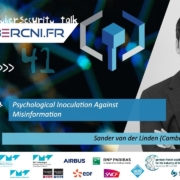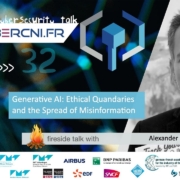[T41] Psychological Inoculation Against Misinformation – Sander van der Linden (University of Cambridge)
On Fri, Dec 13th, 2024, 2pm CET, we welcome Sander van der Linden (University of Cambridge), for another edition of TALK.CYBERcni.fr on “Psychological Inoculation Against Misinformation”. Share and join!
Discover how misinformation spreads like a virus and why it’s so hard to correct once embedded in memory. Sander will present groundbreaking research on inoculation theory, demonstrating how exposing people to “weakened doses” of disinformation techniques can help build cognitive immunity. From real-world social media environments to public health campaigns, learn how innovative “prebunking” interventions are helping citizens worldwide recognize and resist manipulative attempts to mislead.
You are cordially invited to join the free live stream on youtube and LinkedIn! Please share the link https://talk.cybercni.fr/41 with your interested friends!
Trailer: https://youtu.be/GsLbKlqEr1o?list=PLdftPKA9mTfaDJxqwexil2mPhUFIA9ITd
LinkedIN Event: https://www.linkedin.com/events/t41-psychologicalinoculationaga7271822125630439425/theater/
Facebook Event: https://www.facebook.com/events/1306669360464150/
Youtube: https://www.youtube.com/watch?v=yc4M0pS-Yk8&list=PLdftPKA9mTfaDJxqwexil2mPhUFIA9ITd
Stream redirect (for every edition): https://TALK.cyberCNI.fr/stream
Newsletter with invitations: Subscription on https://TALK.cyberCNI.fr
Help us spreading the news
The best talks are those with an interested diverse audience! Therefore, please use the following media to spread the news in your networks:
Thank you!
Abstract
Much like a viral contagion, misinformation can spread rapidly from one mind to another. Moreover, once lodged in memory, falsehoods are difficult to correct. Inoculation theory offers a natural basis for developing a psychological ‘vaccine’ against the spread of fake news and misinformation. Specifically, in a series of lab and field studies, I’ll show that it is possible to pre-emptively “immunize” people against disinformation about a wide range of topics by pre-exposing them to severely weakened doses of the techniques that underlie its production. This process of ‘prebunking’ helps people cultivate cognitive antibodies in both simulated and real social media environments. I’ll showcase several interventions we developed and evaluated—with public health authorities and social media companies—to help citizens around the world recognize and resist unwanted attempts to influence and mislead.
Watch the trailer linked above!
Sander van der Linden
Sander van der Linden, Ph.D., is Professor of Social Psychology in Society and Director of the Cambridge Social Decision-Making Lab in the Department of Psychology at the University of Cambridge. He has won numerous awards for his research on human judgment, communication, and decision-making, including the Rising Star Award from the Association for Psychological Science (APS). He co-developed the award-winning fake news game, Bad News and regularly advises governments, public health authorities, and social media companies on how to combat the spread of misinformation. He is ranked among the top 1% of highly cited social scientists worldwide and has published over 175 research papers. His research is regularly covered in outlets such as the New York Times, BBC, NPR, and Rolling Stone. Before joining Cambridge, he held academic positions at Princeton, Yale, and the LSE. His is the author of Foolproof: Why We Fall for Misinformation and How to Build Immunity which was named of Nature’s Top Science Books and the recipient of the Best Book Prize from the American Psychological Association, the British Psychological Society, the Society for Personality and Social Psychology and the Harvard Shorenstein Centre.
About University of Cambridge
The University of Cambridge, founded in 1209, is one of the world’s most prestigious academic institutions, renowned for its excellence in education, research, and innovation. Located in Cambridge, England, it has a storied history of producing groundbreaking discoveries and world-changing ideas. With 31 autonomous colleges and over 150 departments, faculties, and institutes, Cambridge fosters interdisciplinary collaboration across fields such as science, engineering, arts, and humanities. Its alumni include luminaries such as Isaac Newton, Charles Darwin, and Stephen Hawking, as well as numerous Nobel Prize winners. Cambridge continues to lead in addressing global challenges through cutting-edge research and a commitment to academic excellence.
The Cyber CNI Lecture Series is a free monthly event that typically takes place on the last Friday of the month from 2pm to 3h30pm CET.
The Cyber CNI Speaker series aims to raise awareness and understanding of cyber security issues among all audiences. It aims to enable an ongoing dialogue between experts from industry and academia and the general public (citizens, families, small and large businesses, public organizations, etc.). All of us are concerned.
The events are broadcast live on Youtube (https://talk.cybercni.fr/) and LinkedIn, allowing worldwide remote participation – including a tool to participate in the discussion.
You can add the event calendar via ICS, webcal, HTML.
How the digital transformation is changing our lives
Our society relies more and more on information and operational technologies. Examples include water, energy, heat and cooling supply, communications, healthcare, production and processing of goods, transportation, national security, banking, research and education, and food production.
What all these areas have in common is that they make intensive use of networked distributed computer systems. These systems can be attacked in many ways. This is no longer just a problem for computer “pros” because computer systems are essential to all of us. The effects of “cyber-attacks” range from power outages to the collapse of the health care or banking sectors.
Program and registration: https://talk.cybercni.fr/




